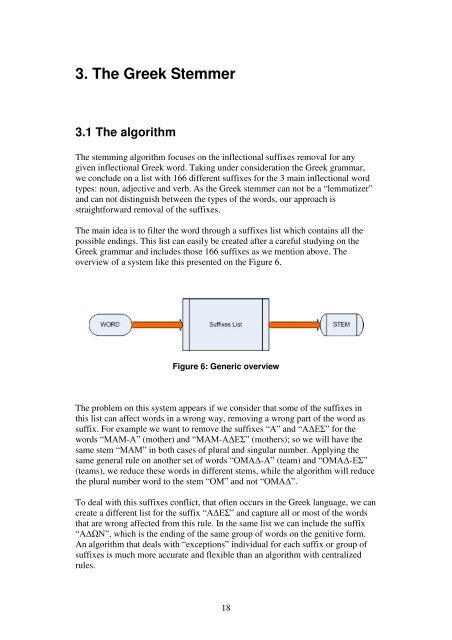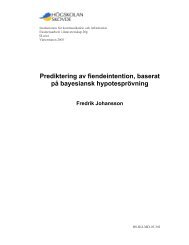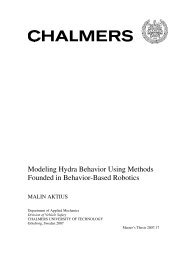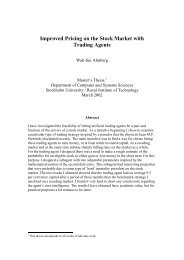Development of a Stemmer for the Greek Language - SAIS
Development of a Stemmer for the Greek Language - SAIS
Development of a Stemmer for the Greek Language - SAIS
Create successful ePaper yourself
Turn your PDF publications into a flip-book with our unique Google optimized e-Paper software.
3. The <strong>Greek</strong> <strong>Stemmer</strong><br />
3.1 The algorithm<br />
The stemming algorithm focuses on <strong>the</strong> inflectional suffixes removal <strong>for</strong> any<br />
given inflectional <strong>Greek</strong> word. Taking under consideration <strong>the</strong> <strong>Greek</strong> grammar,<br />
we conclude on a list with 166 different suffixes <strong>for</strong> <strong>the</strong> 3 main inflectional word<br />
types: noun, adjective and verb. As <strong>the</strong> <strong>Greek</strong> stemmer can not be a “lemmatizer”<br />
and can not distinguish between <strong>the</strong> types <strong>of</strong> <strong>the</strong> words, our approach is<br />
straight<strong>for</strong>ward removal <strong>of</strong> <strong>the</strong> suffixes.<br />
The main idea is to filter <strong>the</strong> word through a suffixes list which contains all <strong>the</strong><br />
possible endings. This list can easily be created after a careful studying on <strong>the</strong><br />
<strong>Greek</strong> grammar and includes those 166 suffixes as we mention above. The<br />
overview <strong>of</strong> a system like this presented on <strong>the</strong> Figure 6.<br />
Figure 6: Generic overview<br />
The problem on this system appears if we consider that some <strong>of</strong> <strong>the</strong> suffixes in<br />
this list can affect words in a wrong way, removing a wrong part <strong>of</strong> <strong>the</strong> word as<br />
suffix. For example we want to remove <strong>the</strong> suffixes “Α” and “Α∆ΕΣ” <strong>for</strong> <strong>the</strong><br />
words “ΜΑΜ-Α” (mo<strong>the</strong>r) and “ΜΑΜ-Α∆ΕΣ” (mo<strong>the</strong>rs); so we will have <strong>the</strong><br />
same stem “ΜΑΜ” in both cases <strong>of</strong> plural and singular number. Applying <strong>the</strong><br />
same general rule on ano<strong>the</strong>r set <strong>of</strong> words “ΟΜΑ∆-Α” (team) and “ΟΜΑ∆-ΕΣ”<br />
(teams), we reduce <strong>the</strong>se words in different stems, while <strong>the</strong> algorithm will reduce<br />
<strong>the</strong> plural number word to <strong>the</strong> stem “ΟΜ” and not “ΟΜΑ∆”.<br />
To deal with this suffixes conflict, that <strong>of</strong>ten occurs in <strong>the</strong> <strong>Greek</strong> language, we can<br />
create a different list <strong>for</strong> <strong>the</strong> suffix “Α∆ΕΣ” and capture all or most <strong>of</strong> <strong>the</strong> words<br />
that are wrong affected from this rule. In <strong>the</strong> same list we can include <strong>the</strong> suffix<br />
“Α∆ΩΝ”, which is <strong>the</strong> ending <strong>of</strong> <strong>the</strong> same group <strong>of</strong> words on <strong>the</strong> genitive <strong>for</strong>m.<br />
An algorithm that deals with “exceptions” individual <strong>for</strong> each suffix or group <strong>of</strong><br />
suffixes is much more accurate and flexible than an algorithm with centralized<br />
rules.<br />
18





